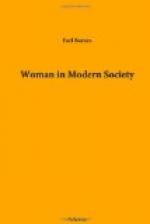But history is not merely the story of the past. To relate that, would take as long as it took to live it, and the result would be but weariness of spirit. History, to be significant, must select the events with which it will deal; it must arrange these in series that are in accord with the constitution of things; and then it must use the generalizations it reaches to interpret the present, and even to forecast the future. It is obvious that this interpretation will depend on the point of view held by the interpreter.
Hence we must ask in what fundamental beliefs this presentation rests. These are, first, that life tends to move along certain lines that constitute the law of human nature. Just as the infant tends first to wriggle, then creep, then walk, then run and dance, so human nature tends to move upward from savagery through primitive settled life to the complex forms of larger settled units. In this progress, material or economic forces play a large part; but ideas, originally born out of circumstances, but sometimes borrowed from other people, sometimes degenerate remnants of past utilities, also play a large part. The progress we finally make is thus directed by this human tendency, by material circumstances, and by ideas. Sometimes it keeps pretty closely to what seems to us to be upward human growth; sometimes it stagnates; sometimes it gives us perverted products; and sometimes it destroys itself.
Thus it becomes necessary to trace the past experiences of woman that we may see with what heritage she faces the future. She is all that she has felt and thought and done. She started with at least half of the destiny of the race in her keeping. Handicapped in size and agility, and periodically weighted down by the burdens of maternity, she still possessed charms and was mistress of pleasures which made her, for savage man, the dearest possession next to food; and for civilized man, the companion, joy and inspiration of his days.
Of woman’s position in early savage times we know only what we can learn from fragmentary prehistoric remains, from the structure of early languages, from records of travelers and students among savages of more recent times; or what can be inferred from human nature in general. Most of this data is difficult to interpret, but it is probable that woman’s position was not much worse than man’s. It is a bad beast that fouls its own food or its own nest; and the female had always the protection of the male’s desire. If she could not entirely control her body, she could still control her own expressions of affection and desire; and, without these, mere possession lost much of its charm.
As keeper of the cave, cultivator of the soil, and guardian of the child, woman, rather than her more foot-loose mate, probably became the center of the earliest civilization. The jealousy of men formed tribal rules for her protection; and to these, religion early gave its powerful sanctions. Thus there came a day when the woman took her mate home to her tribe and gave her children her own name. Even if the matriarchal period was not so important as has sometimes been assumed, woman certainly had large influence over tribal affairs in early savage life.




